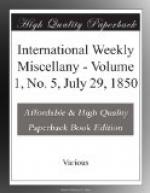per pound for all that is seized, a reward which is
the more attractive to the officers on the frontiers
for the reason that it is paid down and without any
discount. Formerly the confiscated tea was sold
at public auction on the condition that the buyer should
carry it over the frontier; Russian officers were appointed
to take charge of it and deliver it in some Prussian
frontier town in order to be sure of its being carried
out of the country. The consequence was that
the tea was regularly carried back again into Poland
the following night, most frequently by the Russian
officers themselves. In order to apply a radical
cure to this evil, destruction by fire was decreed
as the fate of all tea that should be seized thereafter.
Thus it is that from 20,000 to 40,000 pounds are yearly
destroyed in the chief city of the province.
About this the official story is, that it is tea smuggled
from Prussia, while the truth is that it is usually
nothing but brown paper or damaged tea that is consumed
by the fire. In the first place the Russian officials
are too rational to burn up good tea, when by chance
a real confiscation of that article has taken place;
in such a case the gentlemen take the tea, and put
upon the burning pile an equal weight of brown paper
or rags done up to resemble genuine packages.
In the second place, it is mostly damaged or useless
tea that is seized. The premium for seizures being
so high, the custom-house officers themselves cause
Polish Jews to buy up quantities of worthless stuff
and bring it over the lines for the express purpose
of being seized. The time and place for smuggling
it are agreed upon. The officer lies in wait
with a third person whom he takes with him. The
Jew comes with the goods, is hailed by the officer
and takes to flight. The officer pursues the fugitive,
but cannot reach him, and fires his musket after him.
Hereupon the Jew drops the package which the officer
takes and carries to the office, where he gets his
reward. The witness whom he has with him—by
accident of course—testifies to the zeal
of his exertions, fruitless though they were, for
the seizure of the unknown smuggler. The smuggler
afterward receives from the officer the stipulated
portion of the reward. This trick is constantly
practiced along the frontier, and to meet the demand
the Prussian dealers keep stocks of good-for-nothing
tea, which they sell generally at five silver groschen
(12-1/2 cents) a pound.”
* * * * *
More of Leigh Hunt.[1]
Although a large portion, perhaps more than half, of these volumes has been given to the world in previous publications, yet the work carries this recommendation with it, that it presents in an accessible and consecutive form a great deal of that felicitous portrait-painting, hit off in a few words, that pleasant anecdote, and cheerful wisdom, which lie scattered about in books not now readily to be met with, and which will be




